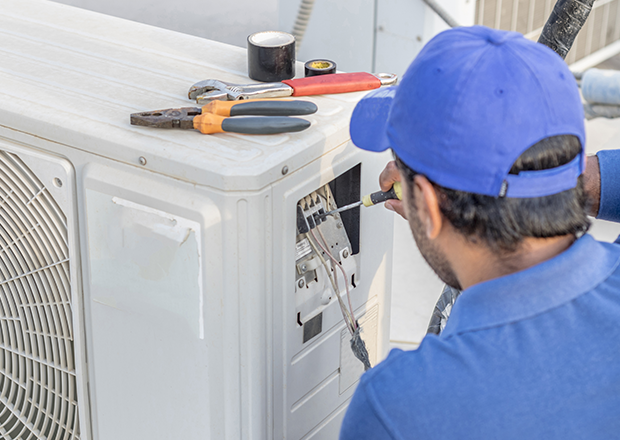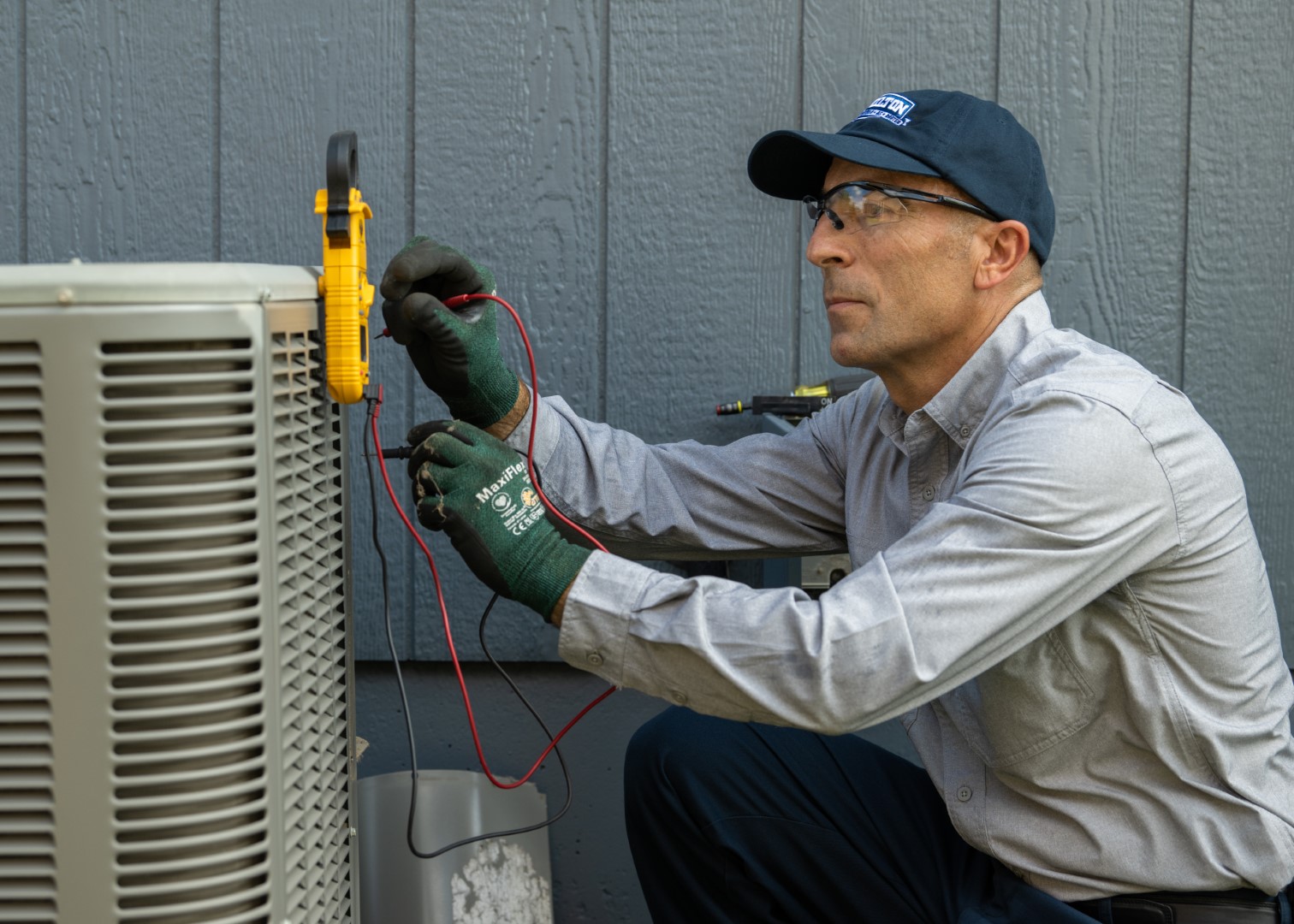The role of regular maintenance in reducing ac fix emergencies
Wiki Article
The Importance of Heating And Cooling Knowledge: Uncovering Reasons For A/c Issues for Homeowners
Home owners usually neglect the significance of understanding their HVAC systems. Identifying usual indications of a/c issues can result in timely treatments. Issues like insufficient air conditioning or uncommon sounds are not simply inconveniences; they can suggest much deeper problems. By exploring the source of these problems, property owners can boost system efficiency and prolong its life expectancy. What are the most common issues that can emerge, and just how can they be successfully addressed?Common Indicators of AC Problems
How can property owners determine problems with their air conditioning systems prior to they intensify? Recognizing common signs of air conditioner troubles is important for timely upkeep. One common sign is not enough air conditioning; if the a/c system stops working to decrease the interior temperature level, it might signify underlying issues. Unusual noises, such as grinding or hissing, can also indicate mechanical failings or loosened parts - ac fix. Additionally, home owners must be careful of strange smells originating from the device, which may recommend mold growth or electrical troubles. Regular biking on and off, recognized as brief cycling, can indicate thermostat issues or refrigerant leaks. Furthermore, a boost in energy expenses without an equivalent increase in use may indicate inefficiency. By staying alert to these warning indications, home owners can stop extra considerable problems and costly fixings, guaranteeing their a/c systems operate efficiently throughout the warmer months
Understanding Cooling Agent Issues
Refrigerant problems can considerably influence the efficiency of a heating and cooling system. House owners ought to recognize the indicators of reduced refrigerant degrees and the importance of identifying refrigerant leakages. Attending to these issues promptly can prevent further damage to the system and assurance height cooling performance.Low Cooling Agent Levels
A typical issue that house owners might encounter with their HVAC systems is low cooling agent degrees, which can substantially affect the system's effectiveness and efficiency. Refrigerant is important for the cooling procedure, absorbing warm from interior air and releasing it outside. When degrees go down, the a/c device has a hard time to cool the area properly, causing increased power consumption and prospective system strain. Signs of low refrigerant include poor air conditioning, longer run times, and ice development on the evaporator coils. Homeowners might likewise observe unusual sounds as the compressor functions harder to make up for the deficiency. It is important for property owners to recognize the significance of keeping proper cooling agent degrees to guarantee peak HVAC efficiency and durability.Refrigerant Leaks Discovery
Where might a property owner start when confronted with the opportunity of cooling agent leakages in their a/c system? The initial step entails checking the system's performance. Indicators such as reduced cooling efficiency, ice formation on coils, or hissing audios might suggest a refrigerant leakage. Homeowners should additionally look for noticeable indicators of oil deposit, often an indication of a leak. Making use of a refrigerant leakage detector can supply even more exact recognition. If suspicions continue, consulting a licensed heating and cooling professional is essential, as they have the experience and devices to situate leaks efficiently. Trigger detection and repair of cooling agent leakages not only improve system effectiveness but also avoid potential ecological harm, making it an essential aspect of heating and cooling maintenance.Electric Failures and Their Impact
Electric failures can substantially impact HVAC systems, specifically through problems like breaker malfunctions and damaged wiring. These troubles not only interfere with the system's performance yet can also lead to costly fixings and safety hazards. Comprehending the ramifications of such failings is vital for house owners to preserve a reliable and risk-free cooling and heating environment.Circuit Breaker Issues
How can circuit breaker concerns impact the performance of a HVAC system? Breaker work as essential security gadgets that handle electrical circulation to heating and cooling devices. If a circuit breaker trips regularly, it disrupts power supply, leading to irregular home heating or cooling. This can cause significant strain on the system, causing inefficient operation and prospective damages to elements. House owners find out here might discover enhanced energy expenses because of the HVAC system's battle to preserve wanted temperature levels. In addition, duplicated interruptions from stumbled breakers can reduce the lifespan of the a/c unit, requiring expensive repairs or substitutes. Regular upkeep of breaker is crucial, as it ensures a steady power supply, eventually enhancing the overall performance of the heating and cooling system.Faulty Wiring Effects
Regularly neglected, faulty wiring can have dire effects for HVAC systems. Wiring problems might bring about short circuits, resulting in regular malfunctions and boosted repair work expenses. Furthermore, inappropriate wiring can trigger inefficient energy usage, leading to higher energy expenses and stress on the system. In serious cases, malfunctioning circuitry can set off electrical fires, posturing a significant safety and security danger to homeowners. These electric failures can harm HVAC elements, resulting in expensive substitutes or comprehensive fixings. Property owners ought to focus on regular inspections by qualified specialists to recognize and remedy circuitry issues prior check over here to they intensify. Recognizing the implications of malfunctioning wiring can aid guarantee the long life and safety of cooling and heating systems, ultimately protecting both the home and its owners.Clogged Filters and Their Effects
While lots of home owners may overlook the significance of routine filter maintenance, stopped up filters can result in substantial effects for HVAC systems. When filters become blocked with dust, dust, and debris, air flow is restricted. This reduction in air movement forces the system to work harder, bring about enhanced energy usage and potentially greater utility costs. With time, this stress can cause damage on components, resulting in early system failing.In addition, clogged up filters can compromise indoor air high quality. Pollutants and irritants may circulate throughout the home, exacerbating respiratory issues and allergies for owners. In addition, inadequate air movement can cause the evaporator coil to ice up, resulting in costly fixings and ineffective cooling efficiency. Routinely changing or cleansing filters is an easy yet crucial maintenance task that can help assure the longevity and efficiency of a/c systems, ultimately benefiting both the homeowner's convenience and their funds.

Thermostat Malfunctions Explained
What takes place when a thermostat breakdowns can significantly impact both convenience and energy effectiveness in a home (AC repairman). A malfunctioning thermostat might fail to properly check out the temperature, resulting in overcooling or not enough cooling. This disparity can cause discomfort for passengers and cause greater power costs, as the cooling and heating system works harder than essentialUsual issues consist of dead batteries, which can make electronic thermostats inoperative, and loose electrical wiring that interrupts communication in between the thermostat and the HVAC device. In addition, obsolete or inadequately calibrated thermostats might not respond correctly to temperature modifications, even more worsening energy inadequacy.
House owners must be alert for use this link indications of malfunction, such as irregular temperature levels or unexpected energy costs. Routine checks and understanding of the thermostat's capability can aid determine issues early, making certain peak performance of the a/c system. Addressing thermostat issues promptly is crucial for keeping a comfy living setting and handling power consumption successfully.
The Duty of Routine Upkeep
Normal upkeep plays a vital role in ensuring the durability and performance of heating and cooling systems. House owners that focus on regular checks can stop small issues from intensifying into costly fixings. Routine maintenance generally includes tasks such as cleansing filters, inspecting ductwork, and inspecting cooling agent degrees. These tasks assist preserve ideal air movement and system performance, reducing energy intake.In addition, a well-kept a/c system runs more successfully, offering consistent convenience throughout the home. Routine tune-ups can also expand the lifespan of the system, bring about significant financial savings in time. Home owners are motivated to set up expert examinations at least yearly to identify possible issues early.
On top of that, several makers require routine maintenance to support guarantees, making this practice not just advantageous yet commonly essential. On the whole, comprehending the relevance of regular maintenance empowers home owners to safeguard their HVAC systems against unforeseen failures and enhance their financial investment in home comfort.
Often Asked Concerns
Exactly How Can I Improve My Air conditioning's Power Effectiveness?
Improving an AC's power performance includes routine upkeep, cleansing or replacing filters, securing ductwork, making certain appropriate insulation, using programmable thermostats, and scheduling professional inspections to recognize and rectify potential concerns impacting efficiency.
What Is the Lifespan of a Common Cooling Unit?
A normal cooling system has a life expectancy of 15 to 20 years, depending upon upkeep, use, and ecological aspects. Regular maintenance can considerably extend its functional life and improve general effectiveness.
When Should I Replace My Air Conditioning System?
An air conditioning system must usually be changed every 10 to 15 years. Indicators for replacement include frequent repairs, rising energy costs, and inadequate cooling, showing that an upgrade may be much more cost-effective and efficient.Can I Troubleshoot A/c Problems Myself?
Yes, individuals can repair air conditioning troubles themselves by inspecting filters, ensuring power supply, and inspecting for visible issues (HVAC company). Nevertheless, complicated troubles frequently call for professional aid for exact medical diagnosis and safe repair, making certain perfect system efficiency
How Do I Choose a Reliable Cooling And Heating Specialist?

To choose a trusted heating and cooling technician, one ought to look for referrals, examine on the internet testimonials, confirm licenses and insurance policy, analyze experience, and request comprehensive quotes to ensure quality service and fair pricing before making a decision.
Final thought
To summarize, a solid understanding of cooling and heating systems allows home owners to successfully identify and attend to usual a/c concerns. Identifying indicators such as insufficient cooling or increasing energy prices enables timely interventions, which can substantially improve system effectiveness and longevity. By remaining informed regarding potential problems like cooling agent leaks, electrical failures, and blocked filters, property owners can take positive measures to preserve their systems, inevitably ensuring convenience and advertising a healthier living setting. Routine maintenance remains essential to this endeavor.Report this wiki page